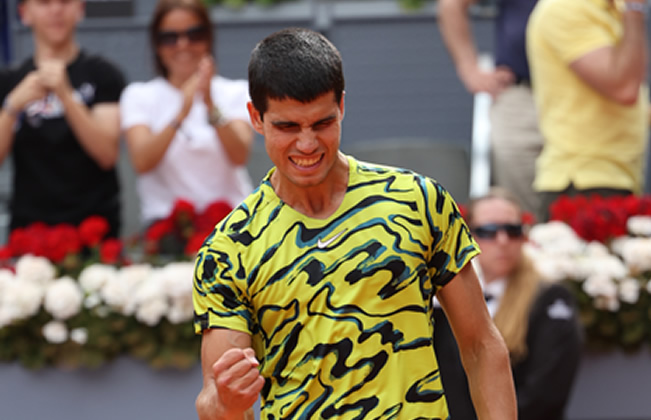
Carlos Alcaraz fought back to defeat Alexander Zverev in a five-set French Open final on Sunday and become the youngest man to win Grand Slam titles on all three surfaces.
The 21-year-old battled cramps to recover from 2-1 down in sets and win a gripping contest 6-3, 2-6, 5-7, 6-1, 6-2 after four hours and 19 minutes on Court Philippe Chatrier.
Alcaraz adds the Roland Garros crown to the Wimbledon title he won against Novak Djokovic last year and the 2022 US Open.
He will head to the Australian Open next year with the chance to become the youngest man to complete the career Grand Slam.
Fourth seed Zverev, who settled a court case in Germany two days ago over domestic abuse allegations, is still waiting for a maiden major title.
He had also lost his only previous Slam final in five sets, when he blew a two-set lead against Dominic Thiem at the 2020 US Open.
Zverev had high hopes of finally getting over the line — he has also lost six Slam semi-finals — but Alcaraz was too strong in the key moments as he levelled their head-to-head record at 5-5.
Alcaraz said before the final he wanted to join the list of men’s players from his country, including his idol Rafael Nadal, to win the Roland Garros title, and he celebrated becoming the eighth Spanish champion by falling to the clay with his head in his hands in disbelief.
– Zverev’s nervy start –
Zverev endured a miserable start, double-faulting on the first two points of the match en route to being broken in the opening game.
But Alcaraz was not immune to the nerves of a maiden French Open final, framing a regulation forehand into the stands and then also double-faulting as he gifted the break straight back.
The Spaniard did not take too long to find his groove, though, breaking to love in the fifth game on his way to pocketing the opener.
The youngster had to save three break points to hold in a 10-minute first game of the second set, but slipped 3-2 behind when he failed to stave off two more break points as another forehand sailed into the crowd.
Suddenly Zverev had a spring in his step and Alcaraz was reduced to scrambling at the back of the court, falling a double-break down with a double-fault.
Zverev wrapped up an ultimately one-sided second set with a hold to love.
The German made it three successive love holds with two more early in the third set, before Alcaraz celebrated coming out of a tricky service game unscathed with a fist pump as he edged 3-2 ahead, despite having been largely on the back foot.
Serving into an increasingly strong breeze, Zverev was caught out by an Alcaraz return that crept over the net and the Spaniard went on to grab a break to love.
But he could not serve out the set as a rasping Zverev passing shot secured a break back.
That failure to take control of the match seemed to temporarily break Alcaraz’s spirit, as he ended up losing five games on the spin to concede the set.
– Crucial line call saves Alcaraz –
Alcaraz would not go down without a fight, though, breaking for a 2-0 advantage in the fourth with a magnificent curling winner on the run.
Just seconds before, Zverev had been angrily disputing a correct line call, drawing jeers from the crowd.
The German was rattled and his serve started to desert him, with Alcaraz racing through the fourth set to force a decider despite having to take a medical time-out to have treatment for an apparent cramp at 4-1.
Zverev had won 10 of his previous 11 five-setters at Roland Garros but handed Alcaraz a break on a platter in the third game of the fifth.
Alcaraz stuttered himself, falling 0-40 down in the next game.
He appeared to have double-faulted on the second break point, but the chair umpire overruled the line judge’s call of out, despite Zverev’s angry protests, before Hawkeye replays showed it was out.
Alcaraz went on to hold and it proved to be a pivotal moment in the match.
Zverev fell a double-break down in game seven as Alcaraz delighted the fans with an outrageous flicked winner before crushing a forehand onto the line.
He wrapped up a historic victory with a booming forehand that Zverev could not get back.
AFP




